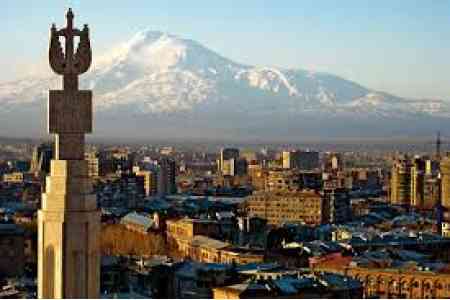


ArmInfo.Fitch Ratings affirmed the ratings of the city of Yerevan, Armenia: long-term issuer default ratings (IDR) in foreign and national currency at the "B +" level with a "Positive" forecast and short-term IDR in foreign currency at the level of "B".
The message on the confirmation of the rating of Yerevan Fitch posted on its website on November 30. Confirmation of ratings reflects the agency's unchanged rating scenario regarding acceptable city budget indicators against the background of a weak institutional environment for local and regional authorities in the country, which are also supported by stable transfers from the central government. The ratings also take into account the capital status of Yerevan and the zero level of debt. The "positive" outlook reflects the outlook on sovereign ratings.KEY RATING FACTORSInstitutional environment (assessment of the factor ): Yerevan's ratings are still constrained by Armenia's ratings ( / forecast) and, in particular, by the institutional environment in the country for local and regional authorities, which Fitch regards as weak. This environment has a shorter stable development history than many comparable international issuers. The weak institutional environment determines the lower predictability of the budget policy of local and regional authorities in Armenia, reduces their planning horizon, and affects long-term development plans.Budget execution indicators (assessment of the factor ): In accordance with the unchanged rating scenario, Fitch expected that Yerevan's budget indicators would remain acceptable with an operating margin, expressed as a low single digit, in 2018-2020. (vs. 2.9% in 2017). Fitch predicts an improvement in the operating margin of the city against the background of economic growth projected in Armenia in the medium term. The intermediate total surplus was 15% of all revenues at the end of September 2018, while the city collected approximately 60% of annual revenues. Fitch also expects that the budget of Yerevan will be close to the balanced one in 2018-2020, which is at the level of historical results (against a surplus of 0.7% in 2017).Yerevan's budget figures continue to depend on financial assistance from the government, and Fitch believes that the city will continue to receive financial support from the government in accordance with historical practice. Current transfers accounted for 72% of the city's operating income in 2017.Capital expenditures of Yerevan at the end of 2017 accounted for 7.3% of total expenditure, which is at the low level of the previous year, when they decreased to 7% compared with the average level of 19.5% in 2013-2015. Fitch predicts a gradual improvement in the implementation of capital expenditures to 8-9% of all expenditures in 2018-2020.The main part of the capital expenditure of the city is financed by transfers from the government and donor grants, as well as through the sale of assets.Debt and other long-term liabilities (assessment of the factor ): As of the end of September 2018, Yerevan still did not have any debt or guarantees. The city retains its debt-free status since the formation of the municipality in 2008. The provisions of the national legal system that determine the issuance of debt or the provision of guarantees limit the city to attract significant borrowing. At the end of September 2018. The city's intermediate liquidity position was good with average monthly cash balances in accounts in the amount of 7.5 billion drams (against 1.9 billion drams in 2017). The city holds cash on treasury accounts, which at the end of September 2018 provided interest income of 178 million drams.Economy (assessment of the factor ): Yerevan is likely to experience a positive impact from the resumption of economic growth in Armenia, predicted in the medium term. In its macroeconomic forecast, Fitch expects growth in the national economy in 2018 by 4.7% and 4.1% in 2019. Being the capital and the city with the largest population, Yerevan is the largest market in Armenia with a developed service sector. At the same time, welfare indicators for Yerevan remain relatively low in the international context, since Fitch estimates Armenia's GDP per capita in 2017. at $ 3,928 based on market exchange rate.Management and Administration (assessment of the factor ): The Government of Yerevan follows a balanced budget policy aimed at ensuring balanced budgets. At the same time, the central government remains the key source of funding for the city. Due to institutional constraints, the planning horizon of a city is rather short - limited to one fiscal year, which hampers the city's forecasting capabilities and complicates strategic planning..
On September 23, 2018 extraordinary elections were held to the city council of Yerevan after the change of power in Armenia. Despite the change of the ruling political coalition, the city authorities continue to work efficiently, ensuring the uninterrupted provision of services and budget management.
FACTORS WHICH CAN IMPACT RATINGS IN THE FUTURE
In the event of a change in sovereign ratings, a similar action will be carried out on the city's ratings, since Yerevan's ratings are constrained by Armenia's ratings.According to AmRating analysts, the assignment of the rating to the capital of Armenia is determined by the plans of the Yerevan mayor's office to enter the market of loan obligations. It should be noted that on December 1, 2017, the Yerevan Mayor's Office and the European Investment Bank signed an agreement on providing 7 million euros for increasing energy efficiency in Yerevan. The agreement signed with the EIB is unprecedented of its kind, since for the first time the community of Yerevan signs a non-sovereign loan agreement. Yerevan became the first community to receive a loan from an international organization without state guarantees - this is the best proof of the confidence placed in Yerevan.Note that for the first time, Fitch Ratings assigned Yerevan a rating on December 2, 2016: long-term issuer default ratings (IDRs) in foreign and national currencies at the level of and short-term IDRs in foreign currency . The forecast at that time was . Later, on December 22, 2017, Fitch Ratings, confirming these ratings, improved the outlook from "Stable" to "Positive".